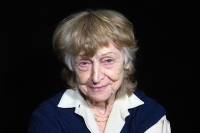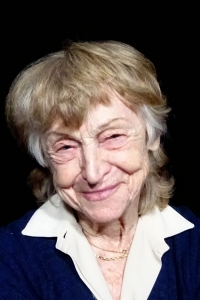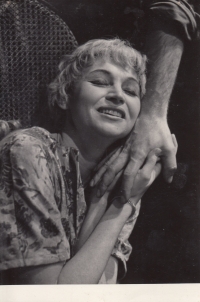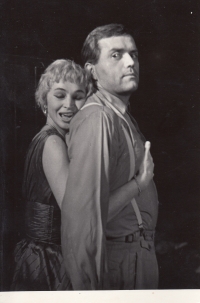People are either decent or not, in any régime
![Marie Viková in the play Šerif se vrací [Return of the Sheriff]. 1961](/sites/default/files/2020-06/Vikov%C3%A1%20portr%C3%A9t%2003.jpg)
Download image
Marie Viková was born on the 4th July of 1935 in Olomouc. In 1945, she lived in Chvalčov near Bystřice pod Hostýnem where she witnessed the end of the WWII and the war front passing from Slovakia. In Olomouc, she graduated at the teachers’ college which trained teachers of the primary schools. Then she went to study acting at the Theatre Faculty of the Academy of Performing Arts in Prague, where she graduated in 1959. She and her circle of classmates around the stage director Jan Kačer accepted jobs in the Petr Bezruč Theatre in Ostrava. Her colleagues left in 1965 to start the Činoherní klub Theatre in Prague. She stayed at the Bezruč Theatre until her retirement and in here, she played many outstanding characters in regular plays as well as in melodramas. She also played in several films and TV series and performed in melodramas. She taught acting at the Popular School of Art and at the Ostrava Conservatory. [Note: in the Czech context, melodrama is not a sensational theatre piece but a specific sort of drama in verse accompanied by stage music.]


![Marie Viková in the play Šerif se vrací [Return of the Sheriff]. 1961](https://www.memoryofnations.eu/sites/default/files/styles/witness_gallery/public/2020-06/Vikov%C3%A1%20portr%C3%A9t%2003.jpg?itok=GaKSH5wJ)



![Marie Viková and František Husák in František Langer's play Periferie [Suburbs] performed in the Petr Bezruč Theatre. 1978](https://www.memoryofnations.eu/sites/default/files/styles/witness_gallery/public/2020-06/IMG_20190514_0014.jpg?itok=hZndQLGd)

![Marie Viková as the Lady of the Dawn in Alejandro Casonas' play La dama del alba [The Lady of the Dawn]. 1974](https://www.memoryofnations.eu/sites/default/files/styles/witness_gallery/public/2020-06/Vikov%C3%A1%2007.jpg?itok=XMmqJgU4)

![Marie Viková and Luděk Eliáš in the play Člověk hledá radost [Man seeks joy]. 1959](https://www.memoryofnations.eu/sites/default/files/styles/witness_gallery/public/2020-06/IMG_20190514_0006.jpg?itok=4fOr5BDl)